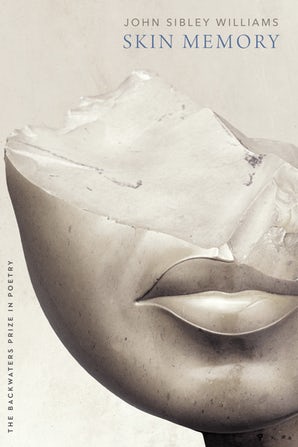Memory Membranes
Skin Memory by John Sibley Williams,
The Backwaters Press (November 2019)
Reviewed by Christa Rohrbach
There lies a certain amount of power in recognition. Seeing something of ourselves in another, a feeling of familiarity, a sense of belonging: these are comforts in an increasingly unfamiliar and unpredictable future. In Skin Memory, this year’s winner of The Backwaters Prize in Poetry, John Sibley Williams asks questions of recognition and belonging. He confronts what the future children of today will inherit while simultaneously evaluating our past, addressing what it looks like to grow into a world that is increasingly unrecognizable.
Skin Memory is a meditation on the nature of humanity in a constantly morphing and increasingly interconnected world. Sibley Williams explores how we are molded by this world, weaving and meandering through landscapes that feel both familiar and fresh. This collection presents ruptures in these landscapes through the use of discordant images before introducing spores of hope which increase in frequency as we dive deeper into the book—an apt evolution set up from the titular poem “Skin Memory” and reinforced as the poems progress. As “Snake. Tree. Rope. Wall.” notes, “Not everything begins all at once / with elephant. Not everything ends / once the details decide on a context.”
Sibley Williams’ grasp of different forms within his collection further bolsters these designs, crescendoing into poems that celebrate forgotten places like “Dear Nowhere” and “Tonight’s Synonyms for Sky.” Skin Memory calls attention to different iterations of being: “the steady collapse of clouds over barns,” “the burning / scent of gasoline and what it takes / for things to remain this green,” “there’s bull elk implied. Or aspen sharpened by shadow.” Existence fluctuates here, as living beings are layered with natural life and Sibley Williams’s speakers question what future iterations of our world will look like.
In “Tonight’s Synonyms for Sky,” Sibley Williams continues playing with these layers. He writes:
After enough pilgrims have kissed
its feet, any statue can be holy. Any
estuary, even after swallowing a few
children, can be known again as a
place of solace. Just give it some
time. If you watch the boats return
empty year after year, how little it
takes for a single herring or crab
to grow miraculous.
Here, Sibley Williams’ narrator posits the role of time in his narrative, musing over what exactly constitutes reverence. He highlights time and absence as two catalysts for change—transferring the power of holiness from place to people. This poem takes the layers presented in “Dear Nowhere” and builds on them, reminding readers of the complexity that contributes to the creation of a world.
To read this collection is to rejoice in the power of words. It’s rare to come across poetry this refreshing and deliberate in its craft, serving as a powerful reminder of what is possible through the power of language. Sibley Williams navigates the complexity of defining and exploring skin memory throughout the collection, telling readers on page one that “skin has a memory all its own […] because memory is a language that’s survived its skin.” Painting images like “unfinished rail track and Douglas fir,” “the haunted house / of our bodies, creaking open” and “stars thrown around / the sky, like toys,” Skin Memory shows readers the complexity of this world we’ve inherited and illustrates how the mundane can be magical. In reflecting our own reality back at us, Sibley Williams asks us to consider the ways in which different memories and metaphorical skins layer over one another, constructing a complex and interwoven terrain within its pages.
Skin Memory is a delightful collection that is equal parts comfort and unsettling, purposeful and powerful in its moves. Sibley Williams lingers in each poem just long enough to paint a portrait of what living in a changing world looks and feels like—the result of which is a collection that meditates on what the layering of the past, present, and future produces. In this world, memory is constructed in a membrane and lives on long after its container has been shredded; all that remains is this electrifying collection.
CHRISTA ROHRBACH is a reader and writer working toward her MFA in fiction at Western Washington University. She dabbles in hybrid writing, fiction, and poetry and is currently working on a hybrid novel and a collection of short stories.
Featured image “Supernova” by Johnny Micheletto
